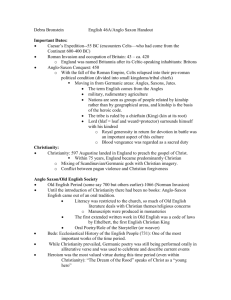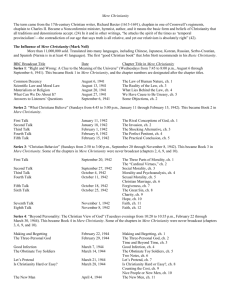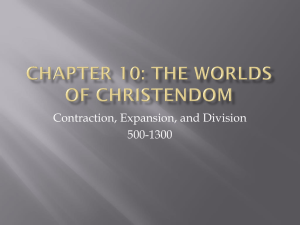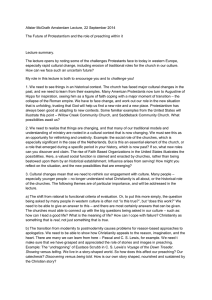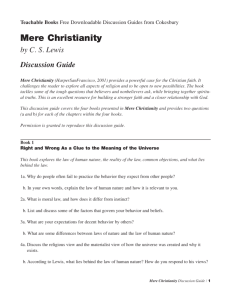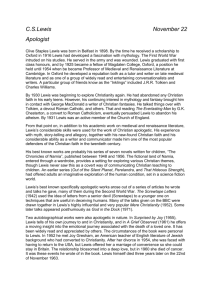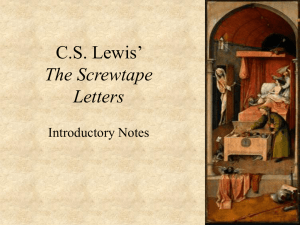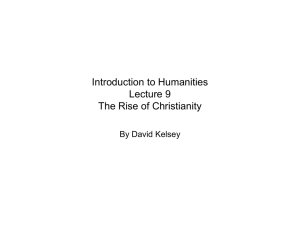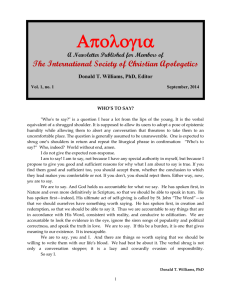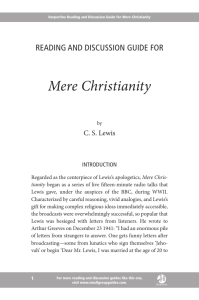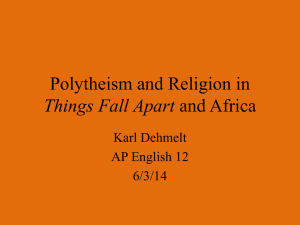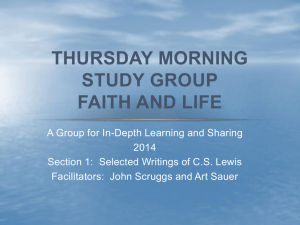Mere Christianity - Joel Heck`s Lewis Site
advertisement
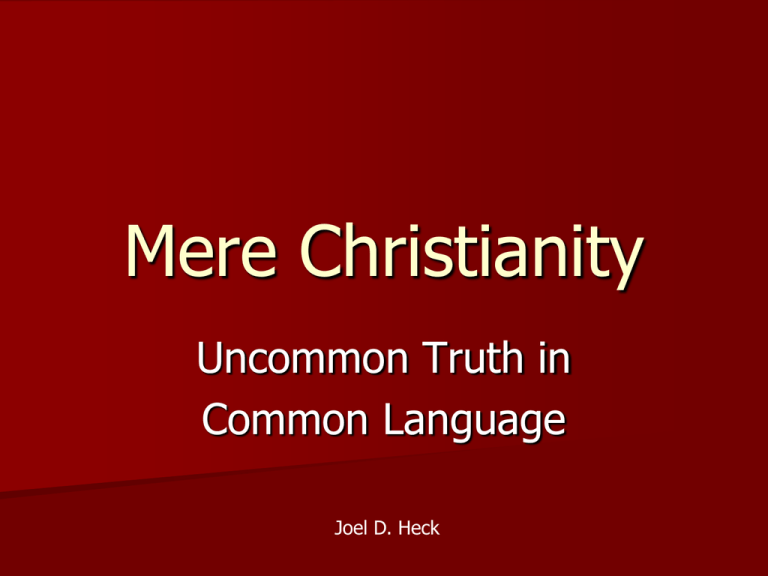
Mere Christianity Uncommon Truth in Common Language Joel D. Heck Lewis’s Top Three The Screwtape Letters The Chronicles of Narnia Mere Christianity The Wade Center The Term “Mere Christianity” – 17th-century Christian writer, Richard Baxter (1615-1691) – “the essential Christian message as espoused historically by Catholics and Protestants alike” – “the theological core on which different Christian traditions can agree” – “the common doctrines of Christianity” – “the basic form and beliefs of Christianity that all traditions and denominations accept” Influence 1993 Christianity Today poll Fiftieth anniversary in 2002 11,000,000+ sold Translated into at least 6 languages John Stott, Basic Christianity “Books that Made Me Catholic,” Deal W. Hudson Indelible Ink, Scott Larsen, general editor Chuck Colson and Thomas Monaghan Characteristics Apologetics (i.e. defense) A reflection of Lewis’s personality (rational, ordered, and imaginative) Autobiographical, i.e. a reflection of Lewis’s life Second most well known voice in England during World War Two Battlefield language (more later) Radio Not Covered Baptism and the Lord’s Supper (the Sacraments) The Virgin Mary Pope as the vicar of Christ or not Military service vs. pacifism The Bible as understood by certain traditions Not Covered Eschatology Remarriage after divorce or not Genesis and science on origins Those who never heard of Christ— lost or capable of salvation Not Covered Baptism in the Holy Spirit and spiritual gifts Seven Ecumenical Councils as authoritative or not Spiritual authority of the local congregation or higher ecclesiastical jurisdictions Worship and music Words from the Battlefield More than one per page (247) Battle, invasion/invade, force (20x), Allies, march, Gestapo, army, blow to bits, soldier (16x), war (80x), ration (21x), battle/battlefield, enemy (22x), fight (16x), struggle, German/Germany, Nazi, infantry, sabotage, rebel/rebellion (9x), surrender (8x), arms (7x), conquest, conquer, Jews, smuggle, and military Written during World War Two by a veteran of World War One Series One Dr. James W. Welch The Problem of Pain Lewis detested the radio Five talks August 6 through September 6, 1941 “Right and Wrong: A Clue to the Meaning of the Universe” (pre-evangelism) Mr. W. R. Childe “If I tell Mr. Lewis that’s ‘feeling the presence of God in flowers and music’ is Eternal Life, . . . .” Lewis challenged his accuser. Mr. Childe neglected to specify his favorite charity. Series Two Five talks January 11 through February 15, 1942 “What Christians Believe” Four Clergymen One Church of England theologian One Roman Catholic One Presbyterian One Methodist No Lutherans! Four Clergymen Probably Austin Farrer, Chaplain, Trinity College, Oxford Dom Bede Griffiths, Roman Catholic friend and adult convert to Christianity Definitely Rev. Joseph Dowell, RAF Padre, Methodist Rev. Eric Fenn, Presbyterian, BBC Series Three Eight Talks September 20 through November 8, 1942 Series Four “Stone” = 14 pounds; “ell” = a mile Seven Talks February 22 through April 4, 1944 “… any reliable firm of assassins, noseslitters, garrotters and poisoners …” Eric Fenn: “They love, or hate.” Publication Schedule Broadcast Talks, the first and second series of broadcasts, 1942 (US: The Case for Christianity) Christian Behavior, the third series, 1943 Beyond 1944 Mere Personality, the fourth series, Christianity, 1952 Reviews “We have never read arguments better marshaled and handled so that they can be remembered, or any book more useful to the Christian…who finds himself called upon to argue briefly from first premises, to say why morality is not herd-instinct, why there is a special and unique character attached to the sense of obligation, why the conviction that there is a law of right and wrong and a transcendent morality is only intelligible if there is a God.” (The Tablet, July 18, 1942) Reviews “No writer of popular apologetics today is more effective than Mr. C. S. Lewis.” (The Times Literary Supplement, Sept. 19, 1942) Reviews “The author shows himself a master in the rare art of conveying profound truths in simple and compelling language.” (G. D. Smith in The Clergy Review , December 1942) Uncommon Language! Truth in Common The BBC in “Shadowlands” “Christian Marriage” on October 11, 1942 during the third series of BBC talks A video segment The End
